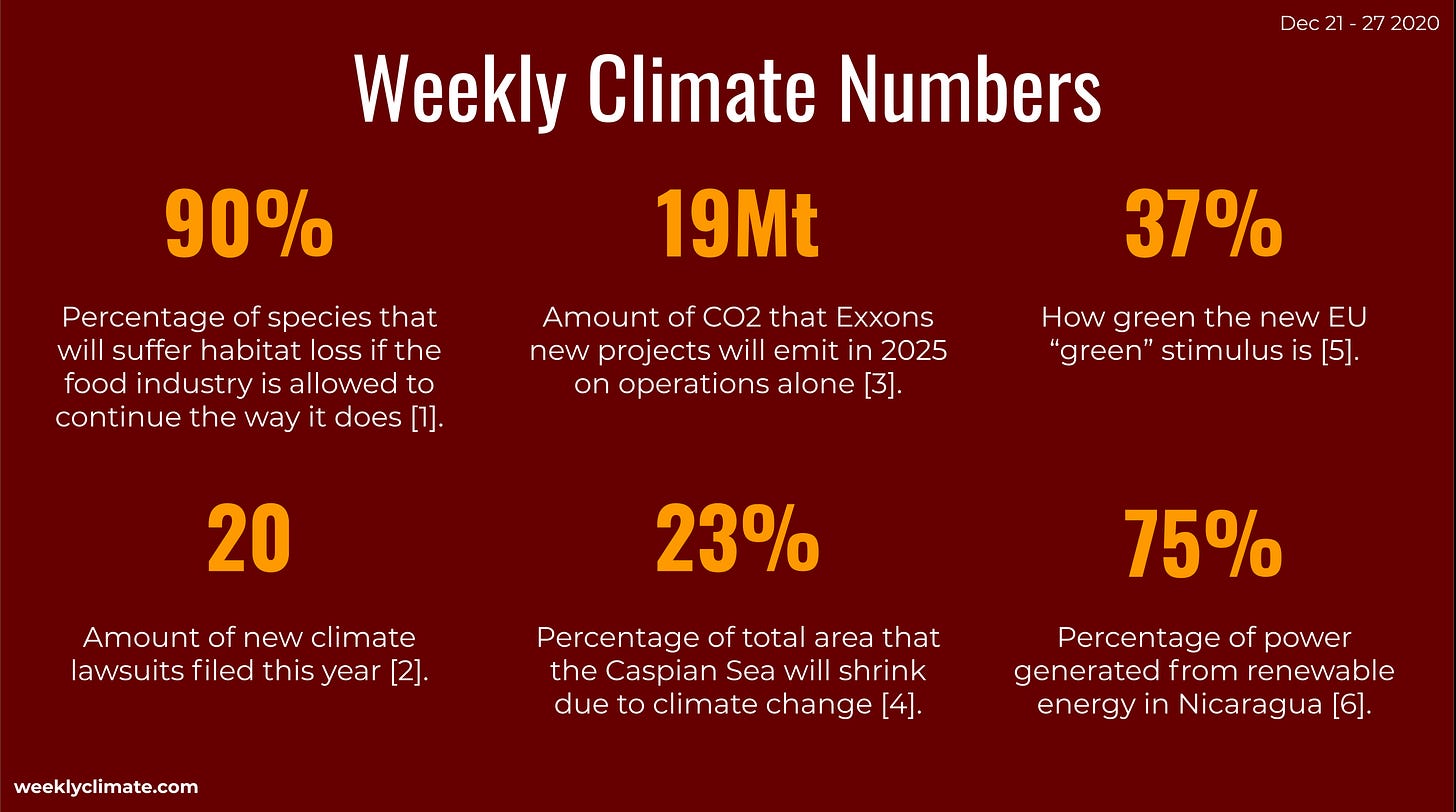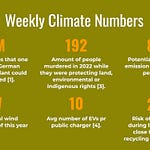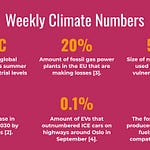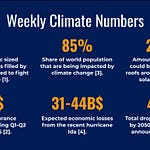Welcome to this weeks edition of The Weekly Climate 🎉
References: [1], [2], [3], [4], [5] and [6]
This week we’re just going to start off with this leaked internal Exxon x-mas holiday video courtesy of the Climate Ad Project. Please watch, it’s really great.
… because it’s true.
‼️News you can’t miss
A part from the excellent Exxon ad above, there’s more Exxon news such as the fact that it doesn’t want to tell anybody about how much it’s new projects are going to pollute. In fact it sells some of them as climate-beneficial. Former Exxon CEO, Lee Raymond steps down from the biggest fossil fuel supporter in the world, JP Morgan’s, board — yay! And shipping-gate may be underway aaand finally, the worlds ecosystems may not be sequestrating CO2 as fast as it used to.
🐙 ... also octopusses have been found guilty of punching its fish hunting buddies out of spite. The videos are adorable in some way. But also it’s kind of bullying. 🤨
👩⚕️ Status: Climate & Science
Let’s look at how we’re doing this week!
[#storm] — Inside Climate News looks back at the 2020 hurricane season which brought a record 30 storms which has ravaged exceedingly poor and black neighborhoods like never before.
[#iceberg] — Inside Climate News goes into detail about the gigantic A68a iceberg which broke off from the South Pole 3 years ago and are now headed towards a prime biodiversity spot. Not only is the iceberg so big that if / when it breaks up it will likely send a horde of smaller icebergs straight into shipping paths but it also threatens this crucial biodiversity spot of South Georgia Island.
[#shrinking] — Sure, you have heard about sea level rise, but sea shrinking? A new study has shown that climate change could cause the Caspian Sea (I know I know, not really an ocean) to shrink. The Caspian Sea is the world’s largest inland body of water and lies between Europe and Asia. Climate change could shrink the surface area of it by as much as 23%.
[#hell] — Take a look at these satellite images of the Earth burning this year. The Earth surely looked like hell this year...
[#weather] — Yale Climate Connections look at the top 10 weather and climate events of 2020. And it’s not a boring read... Unfortunately.
📰 The 7 Grand Challenges
⚡️Decarbonize Electricity
Clean electricity is the one do-or-die challenge we must solve.
[#coal] — As was highlighted in last weeks newsletter, coal is dieing and its dieing particularly fast in Europe. This blog post goes into detail.
[#biomass] — A great look at what EUs infatuation with biomass means for the communities providing the biomass: Lots of air pollution, almost no new jobs and tree loss. Let’s stop doing this, shall we?
[#india] — India is working hard to supply it’s roughly 1.4B people with power and it has pledged to make much of that renewable. This means that before 2030 it needs to install 250GW or around 30GW every year, which means it must double the rate it’s currently deploying.
[#nicaragua] — Nicaragua has successfully electrified 1.2M homes this year and is rocking it with 75% renewables in the mix. Surely an inspiration for those of us lucky enough to live in countries that have had electricity for a long time and are still knee deep in fossils.
🏘 Reduce impact of urban and rural areas
Lowering the impact of urban and rural areas.
[#fossilcars] — The end of internal combustion engine (ICE) cars is coming faster than many people will expect, as this article highlights, many countries around the world are planning bans of ICE cars by 2030s.
[#EVs] —And related: Inside Climate News looks as the year 2020 for EVs. And EVs did indeed have a good year, but we’re not quite there yet. While political pledges have not been the shortcoming, sales have. US auto sales have taken a hit due to COVID and only 2% of auto sales were EVs. Whereas in Europe hybrid (buh!) and EV sales are up 130% from October last year. Reasons for not purchasing an EV are cited as range anxiety (which is really just a perceived problem and not a real problem) and pricetag.
[#australia] — A new report says that Australia’s transport emissions are already back to pre-pandemic levels even before 2021 rolls in. However, the report also highlights that Australia is generating a lot of renewable energy.
🛁 Clean non-electrifiable activities
Some activities we do today can’t be electrified, these must be cleaned some other way.
[#shippinggate] — Remember that disastrous oil spill off the coast of Mauritius earlier this year? Turns out it’s part of a much bigger problem. The article linked to explains that the ultimate cause of the spill was an experimental fuel which 70% of all major cargo ships around the world is using and which is known by the ship fuel industry to have major problems hence threatening coasts around the world. And guess what? The fuel was introduced last year to “make the shipping industry look more green than it really is”.
[#industrialwaste] — A group of researchers at Kanazawa University in Japan has successfully found a method to remove precious metals from fluid industrial waste. The method uses and absorbent to bind the precious metals. Following the absorption the material can be incinerated to yield precious metal pellets like silver, palladium and others.
🌳 Protect and grow nature
Nature is our ally, we must protect it and help it help us.
[#carbonsinks] — A new scary study published in Science earlier this month suggests that the land ecosystems are becoming poorer at capturing CO2. The so called CO2 fertilization effect (CFE) has dropped from 21% in the 1980s to 12% now. The CFE is a factor that describes the relationship between an increase in CO2 and the resulting increase in photosynthesis. Thus effectively the amount of CO2 a plant can sequester when growing.
[#carbonsource] — And another scary study from a group of Brazilian researchers have found that several non-amazonian forests are beginning to act as carbon sources instead of carbon sinks. The forests are acting like this due to intense burning of forests as well as general increase in temperature due to climate change.
🍽 Optimize food
Without the lower impact of food or drink the hero doesn’t work (modified old danish proverb).
[#biodiversity] — 90% of species on the planet is expected to suffer habitat loss by 2050 due to the global food industry. Conclusion is pretty stark: If we want to live in a world with a similar biodiversity as we have today we have to significantly change what we eat and how we produce it.
⚖️ Climate Justice
Without justice there’s no future.
[#lawsuits] — The DesmogBlog looks back at the 2020 climate lawsuits. At least 20 new cases was launched in a lot of different countries. Unfortunately, most of the lawsuits targetting fossil fuel industry is stuck in procedural battles mainly regarding which court need to handle it. A classic fossil fuel industry tactict.
[#pipeline] — Once again, the fossil fuel industry tries to push a fossil gas pipeline down people’s throat. This time violating it’s requirement to notify citizens next to it. And who do you think the pipeline will affect? Well black communities of course as per usual.
⬇️ Drawdown
Removing carbon from the atmosphere one way or another.
[#carboncapture] — A detailed reminder that carbon capture is not here to save us for many reasons. First of all it’s not even close actually being here. Many of these technologies have huge scaling issues. But another very major reason is that fossil fuel industry love it. Except that Exxon recently decided that it was not worth pursuing. What makes carbon capture such a tricky issue is that lawmakers are relying on it for the 1.5C and 2C scenarios to make any sense at all. And this is so scary given how immature and unproven the technology is. It’s almost like building a 500 seat airplane before the first airplane was even built and start taking money for tickets. Do you want a ticket?
📦 Other / catch-all
All the other stuff that I couldn’t fit into any of the other categories, than the other category.
[#paris] — In what’s probably the final look at the Paris agreements 5 year anniversary, Inside Climate News gives it a good look. And as the others conclude it’s a mixed bag. Global emissions are flattening (but that is not even close to being enough) and some of the big industrial countries do appear to commit to more ambitious targets.
[#eu] — EU just approved the world’s largest “green” stimulus. How green you may ask? Well 37% to be exact. The stimulus unfortunately also includes gas investments. It’s amazing that gas investments can still be called green.
[#myths] — 41 scientists debunk popular climate change myths such as net zero pledge is enough to solve the climate crisis. It also paints a stark picture of the whole idea of carbon offsets.
⭐️Special Topics
🇺🇸 U.S. Presidential Election
We have a special interest in covering the U.S. Election as Bidens actions may or may not give the world hope in a world that’s starved for it.
🎧 Nerd-alert: I love Saul Griffith. Here’s an interview with him in the 🎧podcast Political Climate about his daring plan to have the U.S. lead the effort on climate change. Something that is definitely more likely now that Biden won. He also wrote this excellent post recently about what he would do if he was Secretary of Energy.
A group of scientists working in the Trump administration have the past 4 years mounted a guerilla like offense to make sure that Trump wouldn’t get away with killing the planet. Read about their exploits in this in-depth article from Inside Climate News.
⛽️Major Carbon Emitters
We have a special interest in covering the moving of the major carbon emitters as these are the key roadblock to climate action.
[#autodesk] — Autodesk like many other tech-giants are under fire because it sells its computer-aided design tools to the fossil fuel industry. Now leaked documents show how Autodesk is trying to silence one of it’s critics. See this for more detail about the german company who is Autodesks customer.
[#blackrock] — BlackRock, the largest investor in the world holding 8T$, surprised everybody last year when their CEO Larry Fink went out and proclaimed to join the climate fight. It was such a surprise that he was awarded Institutional Investor of the Year. That award though seemed to be given just a tiny bit too early. Like awarding the most valuable player award to some player who is outspoken about his goal to play well this season. The New Yorker looks into what BlackRock has actually done. And it’s not much.
[#exxon] — How much does Exxon pollute? Short answer a lot. This detailed Bloomberg report (also used in Weekly Climate numbers) has the whole picture.
[#jpmorgan] — Promising news from the worlds biggest fossil fuel supporter JPMorgan. Lee Raymond, the former Exxon CEO, steps down from JPMorgans board after activists have put increasing pressure on the bank to remove him due to Lee’s extensive and damning anti-climate track record.
[#china] — China suffers from widespread blackouts these days. The blackouts are due to two things: (1) A ban on coal imports from Australia due to a trade dispute and (2) a 9% increase in power demand from last year due to increased industrial activity.
[#us] — US Congress just passed a tax break for companies working on enhanced oil recovery 🤦♂️. Great work fossil lobbyists!
[#norway] — Norways Supreme Court rejected an effort aimed at invalidating offshore drilling licenses due to the citizens right to a clean environment. Norway has one of the cleanest energy grids in the entire world so it’s clearly not going to be any Norwegian problem if other countries burn the oil that they dig up. But wait... Isn’t the climate crisis global? 🤦♂️
[#netherlands] — And we finish off with a good one: Amsterdam becomes the first city in the world that wants to ban fossil fuel advertising. This is really great — and there’s no reason why other cities and countries shouldn’t follow suit.
That’s it for this week folks! Remember if you’re feeling down, angry or sad from some of the news in this newsletter one cure is to act. And one way you can always act that also happens to be one of the most powerful things you can do is to talk about it. That also works if what you just read made you hopeful or happy btw.
If you enjoyed this newsletter don’t forget to share it with your friends, coworkers or other people you think could benefit from getting it. If you got directed here by a friend or another link on the Internet don’t forget to subscribe!
See you all next week 👋

















Share this post